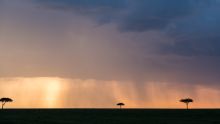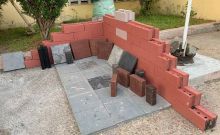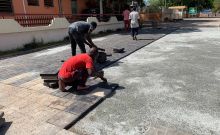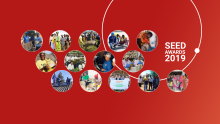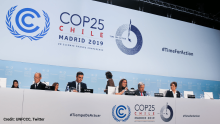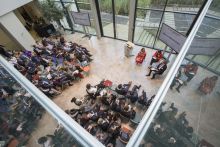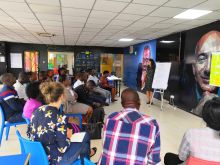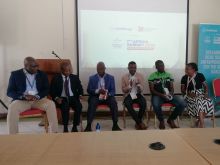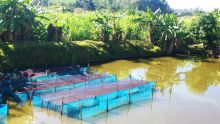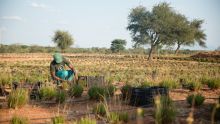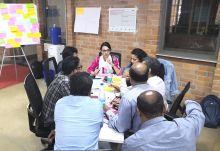- We caught up with BioAfriq founders and SEED Starter alumni Doreen Achieng Ochieng-Ivisu and James Nyamai, the husband and wife who recently were selected to join the Kenya Acceleration Programme 2019 by CIC Kenya. Their story started when they realised the damage charcoal was doing to their country, where tree cover is at only 3%. In this catch-up, they talk about separating their private from their business life, the difficulty of changing farmer mindsets and why BioAfriq is here to stay.
- Co-founder and Chief Technology Officer, James Van der Walt tell us how being on a ferry in Ireland and a monastery in New Zealand inspired the founding of his eco-inclusive business idea. These days, they’re busy with SANEDI working on developing Baby Turtles which would be smaller, cheaper versions of their original prototype.
- BDS providers offer valuable support for SMEs, often behind the scenes. In this five-part special focus blog series, we caught up with a number of BDS providers from Ghana, Indonesia, India, Thailand, and Uganda.
- Are you a business coach or do you work for an incubator or business support organisation in Asia or Africa? Here are three reasons to focus on the social and environmental impact of the start-ups you work with.
- We caught up with a number of BDS providers from Ghana to Indonesia to see how BDS providers experienced the training. What were their biggest takeaways?
- BDS providers provide crucial help eco-inclusive, micro, small, and medium enterprises to overcome day to day challenges around fundraising, direction or finding talent. Are you a BDS provider? Read on to find out if you share similar challenges with others.
- At SEED ToTs, participants – BDS consultants, incubators and accelerators – enjoy peer-learning and have the opportunity to network and build partnerships. When we asked several BDS ToT participants what their main takeaways were from the workshops, many mentioned the networking possibilities and new partnerships formed.
- Often when we think about business development services, we think about consultants who help businesses grow and scale. We asked some of our past BDS ToT participants which other actors would benefit from BDS ToT and here is what they suggested.
- “Khainza” is a reference to a small person with high energy and ability. It is also Arthur Woniala, the founder's, mother’s maiden name. Khainza Energy is committed to providing clean, safe, and affordable cooking fuel solutions to Ugandans. We caught up with Arthur to hear how SEED Support has helped change his business & what Khainza is up to these days.
- Tackling poverty and climate change, generating employment opportunities and contributing to economic development, this year’s 14 SEED Award winners were selected from over nine hundred applicants and were recognised for solutions to major local and global challenges.
Lilongwe, Malawi, Berlin, Germany, 24 October 2019 - Tackling poverty and climate change, generating employment opportunities and contributing to economic development, this year’s 14 SEED Award winners were selected from over 900 applicants and were recognised for solutions to major local and global challenges.
- SEED’s two-pronged approach to supporting enterprises through direct support and ecosystem building activities is founded on the belief that enterprises rely on both internal and external success factors to grow their solutions.
- SEED’s Executive Director Dr. Lewis Akenji was present in Madrid and participated in multiple events to share how SEED supports climate-smart small and medium sized enterprises to develop innovative solutions to major climate finance challenges. As well as the innovative approaches of the SEED Low Carbon Award Winners & Finalists to reduce plastic waste.
- In late October, seven policy practitioners took to the stage during the SEED Practitioner Labs for Policy Prototyping scale-up labs in South Africa and Malawi. The practitioners shared their ideas of policy solutions to leverage the potential of eco-inclusive enterprises in driving the transition to green and inclusive economies.
- Ms Kasturi, Founder of Daily Dump (SEED Low Carbon Award Winner 2018), was welcomed as keynote speaker during the BEYOND THE KNOWN: Practitioners’ Exchange to Discover New Ways to Promote Entrepreneurship & Support MSME Development from 15-16th October at the GIZ Representation in Berlin.
Rainer Agster, Director of Operations at SEED, was present during WSDS 2020 to launch the SEED India hub and to introduce two eco-inclusive enterprises (Aikya Organics & Daily Dump) that are developing solutions for the challenges of climate change.
- The threat of climate change exacerbates already existing inequalities, and increases the urgency of the need for resilient communities. But building this resilience presents a complex challenge: How can the world’s most marginalized communities effectively pursue growth, work toward the Sustainable Development Goals and overcome climate-related crises – while involving the rural households, women and youth who are most affected by climate change?
Seven of our SEED Malawi eco-inclusive enterprises - Chonona, Green Impact Technologies, Green Ventures, Honey Products, Hortinet, Inte Waste and Ziweto – were recently able to raise funds that will help them scale-up and achieve their full growth potential.
- SEED brings BDS advisors together to share experiences and increase mutual collaboration, allowing for the ecosystem and practitioner community to grow and mature. Read on to find out more about the opportunities SEED ToTs bring to BDS providers, and why we think our tools and training are a good fit for that market.
- As part of a panel at the Sankalp Africa summit 2020, four SEED representatives joined a panel on impact investing in Zimbabwe to do some myth busting and explain present investment opportunities in the country.
- Earlier this month was International Women’s Day. A time to celebrate and recognise the achievements and success stories of enterprises focused on working with women towards greater gender equality. Two inspiring examples of SEED’s many award-winning enterprises working with women are Masupa Enterprises in Uganda, run by Margaret Kyamulabi, Executive Director, and Frontier Markets in India, founded by Ajaita Shah, CEO.
- Seven of our SEED Malawi eco-inclusive enterprises – Chonona, Green Impact Technologies, Green Ventures, Honey Products, Hortinet, InteWaste and Ziweto – were recently able to raise significant funds that will help them to scale-up and achieve their full impact potential. We asked them to share their fundraising journey and learnings with you.
- At SEED, we have been concerned and touched by the COVID-19 pandemic as well. As of last week, we have moved into remote working mode.
- Digital innovation is a great way to accelerate social, environmental and economic transformation, for enterprises to tackle challenges such as climate change, food security, gender equality, and scale-up solutions more quickly through technology.
- Digital innovations can bring significant benefits to stakeholders in the agriculture sector. Take rural farmers who face challenges including a lack of access to information on markets, need advice on productivity gains, and struggle with obtaining credit and low levels of financial inclusion.
- The term “survival of the fittest” suggests that organisms best adjusted to their environment are the most successful in surviving, it seems this also applies to business in tough times. Adaptiveness is certainly a quality that Adi Reza Nugroho, the CEO of Mycotech, an enterprise producing leather and leather products from mushrooms, has in spades. Resilient to changes, positive but not too optimistic, he hopes for the best but prepares for the worst. Here he shares his coping strategies dealing with the COVID situation.
- Through the Training of Trainers (ToT), SEED is helping Business Development Services (BDS) advisors and enterprises harness opportunities that arise from climate change.
- The improvement of waste management systems across the world is vital to reduce environmental degradation, but only 9% of the world’s plastic waste was recycled by 2015. But digital solutions can support changes in consumer behaviour and increase the education of residents on proper waste sorting techniques and the availability of door-to-door collection.
- SEED is looking forward to bringing Training of Trainers (ToTs) workshops for Business Development Service (BDS) providers also to non-metro cities in India. SEED trains BDS providers on toolified and collaborative approaches that help early stage eco-inclusive enterprises have more impact.
- January 13 marked the first reported coronavirus case outside of China – it was reported in Thailand. A little more than 2 weeks later – on January 30, WHO declared COVID-19 a global public health emergency. This emergency doesn’t only pose a threat to individual health but, inevitably, also affects our healthy enterprises. SEED had a chance to catch up with our 2019 SEED Awards winner from Thailand, Fang Thai Factory, on how they are doing and dealing with the epidemic. There are some key points we feel could benefit and/or inspire peers who face a similar struggle.

